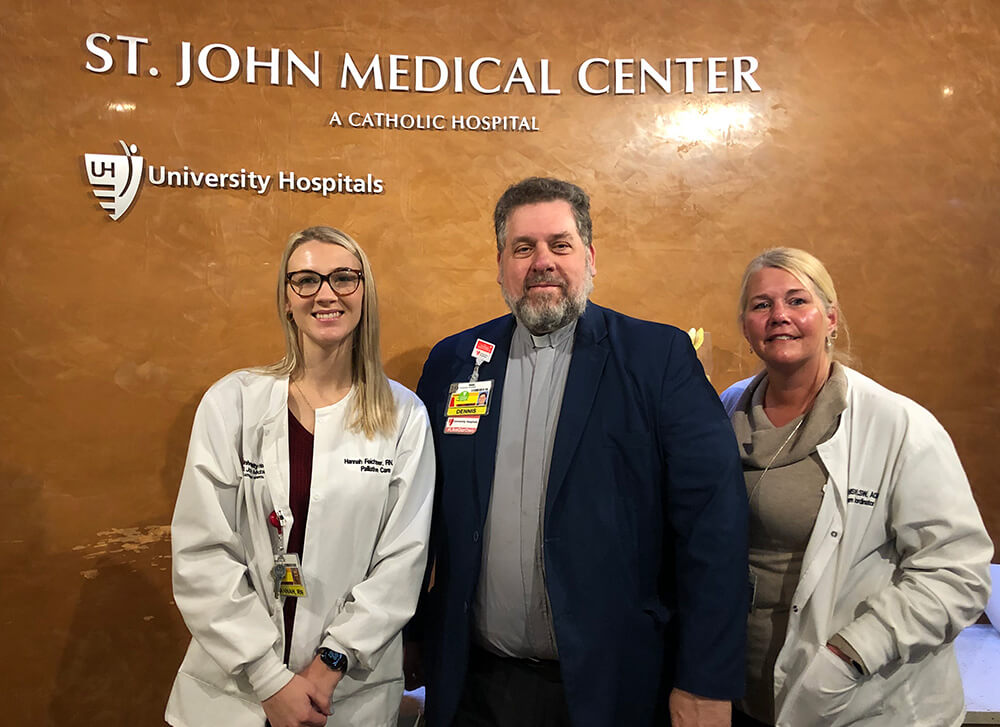Palliative Care for Patients with Chronic Illness
March 08, 2022
Innovations in Geriatric Medicine | Wnter 2022
The diagnosis of a chronic illness can turn a patient’s life upside down. In those cases, palliative care provides multidisciplinary, patient-centered, supportive care to patients and their families from initial diagnosis through the course of the illness and, when appropriate, helps patients transition to end-of-life hospice care.
Palliative care equals holistic care
University Hospitals St. John Medical Center offers a robust palliative care program, which begins with educating providers, says Hannah Feichtner, RN, BSN, a palliative care nurse.
“We provide education to incoming residents every year, meeting with them one on one to explain what palliative care is and what symptoms and medical history will qualify a patient for palliative care,” Feichtner says. “We give residents the confidence to be autonomous and to suggest palliative care consultations to their attending physicians, sometimes as early as when a patient presents in the emergency room.”
Any patient with advanced disease, such as late-stage cancer, liver disease or heart failure, may be a candidate for palliative care, says Rachel Kelch, LSW, MSW, ACHP-SW, Coordinator of Palliative Care at UH St. John Medical Center.
“Palliative care helps manage the symptoms of chronic illness, including pain, nausea, vomiting, diarrhea and weakness to prevent or minimize suffering,” Kelch says. “It also provides emotional support to patients and their families. A new diagnosis or an abrupt change in a patient’s quality of life can trigger a palliative care consult, or when a family is having a difficult time transitioning into a new lifestyle due to a chronic illness.”
The UH palliative care team includes attending physicians at UH St. John Medical Center, a palliative care nurse, social worker, coordinator and chaplain to address patients’ entire physical and emotional needs as they relate to chronic illness.
 Palliative Care members at St. John Medical Center L to R: Hannah Feichtner, Dennis Kristof, Rachel Kelch.
Palliative Care members at St. John Medical Center L to R: Hannah Feichtner, Dennis Kristof, Rachel Kelch.Hospice: Transitioning to end-of-life care
“It’s widely known that hospice seems to be involved very late in chronic illness, as late as 24 to 48 hours before the end of life,” Feichtner says. “Our mission is to advance that time. Patients don’t always understand the benefits of early hospice care for their comfort and quality of life.”
Feichtner says palliative care providers are comfortable initiating difficult conversations about the benefits of hospice early in a patient’s illness when they can still be involved in the discussion.
Kelch adds, “At St. John, we have a hospice nurse on site. They are an extension of the palliative care team and know our palliative care patients. Hospice providers recognize when patients and families may benefit from hospice. It’s a very collaborative effort and the transition is usually smooth. The family is confident and trusting because of the relationships we’ve built.”
Hospice is 100 percent covered by Medicare, Kelch says. It offers 24-hour support, including medication and medical supply needs, home visits and access to the medical team. Hospice generally allows patients to remain at home, which is what most prefer. UH also has an in-patient unit for those with many symptoms or who are actively dying.
“When patients pass, hospice care continues with bereavement counseling for the family,” Feichtner says. “It really is a comprehensive program.”
Kelch says hospice care was especially important during the pandemic, when nursing home restrictions made it difficult for patients to see their loved ones.
Getting the word out
Kelch and Feichtner spend a lot of time educating providers about palliative care.
“We’ve joined a lot of committees at the hospital, from critical care to nursing to the emergency room,” Feichtner says. “We visit other departments and work closely with the case management team, which plays an important role in discharge plans for patients.”
UH is also automating the process of identifying and referring patients to palliative or hospice care with triggers to prompt physicians to request a palliative care consult for those patients with advanced disease or Do Not Resuscitate orders.
Underutilized benefit
“Palliative care is very beneficial for patients at every stage of chronic illness,” Kelch says. “It’s not just for the end of life. Patients who receive palliative care support have a greater quality of life. It’s really about comprehensive medicine. Getting us involved from the beginning allows us to develop relationships with the family and helps prevent hospital admissions and readmissions.”
Feichtner emphasizes that if providers are not comfortable or confident discussing palliative or hospice care, they should know they can refer their patients to those who are.
“We provide a safe space and can have these tough discussions with your patients,” she says.


